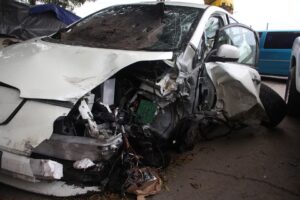Car accidents occur when two or more vehicles collide or when a motorist hits an object or a pedestrian. Drivers are often encouraged to engage in safe driving practices to reduce their vulnerability to car crashes. Embracing safe practices on the road increases drivers’ control over their activities while driving, allowing them to make better decisions that reduce their risk of causing an accident. Although becoming a car crash victim may be unavoidable since we cannot control other drivers’ actions, it is still essential to understand the necessary steps to adopt when involved in car accidents. This will help a driver protect their rights to pursue compensation in case of liability. Motor vehicle accidents can have devastating physiological, emotional, and psychological effects on victims. A car accident victim can also incur additional expenses in repairing the vehicle or treating their injuries. Experienced car accident lawyers can provide the necessary assistance to navigate through the often cumbersome legal process and ensure the insurance company offers the full compensation required to cover your vehicle repair costs and medical injury bills.
What to Do After Being in a Car Accident
 If you are in a car accident, you must stay calm and preserve your right to pursue fair compensation. A car accident can be a frightening experience that may leave you confused. It is crucial to understand what steps to take after being involved in a motor vehicle collision.
If you are in a car accident, you must stay calm and preserve your right to pursue fair compensation. A car accident can be a frightening experience that may leave you confused. It is crucial to understand what steps to take after being involved in a motor vehicle collision.
Step One:
The first step is seeking medical services to safeguard your well-being. You should retain all evidence relating to your medical care, including bills, imaging scans, receipts, physician’s contact information, and medical prescription. Following the doctor’s recommendation allows you to recover quickly and access relevant and valuable information that will support your claim.
Step Two:
Next, you should inform the local authorities. The responding officers will write a police report when they show up at the scene. Their report will provide an account of the state of the accident. If not made at the accident scene, you can also file a police report. The police report is crucial evidence when filing compensation.
Step Three:
Taking pictures of the vehicle involved in the accidents and your injuries can serve as essential pieces of evidence in your case. You should collect contact and insurance information from all drivers involved, including information from any witnesses. Collecting this information will make it easier for your auto accident attorney to build a case for the insurance company.
Final Step:
Refrain from speaking to adjusters or anyone from the at-fault drivers’ insurance company. Instead, you should contact our car accident attorneys, who can provide you with proper guidance on the necessary steps you should take in filing an auto accident claim. A lawyer can discuss your case and offer you valuable advice on moving forward with your claims. Attorneys can investigate the accident to ascertain facts, identify at-fault drivers, estimate the claim’s actual value, negotiate for fair compensation with the insurance firm, and represent you in court if you decide to file a lawsuit. Lawyers will defend your rights and ensure you earn the compensation you deserve.
Common Causes of Car Accidents
Car accidents can arise from driver errors or the negligence or carelessness of another party. Driver error accounts for the highest cause of car accidents. If a negligent driver injures a car accident victim, they are entitled to compensation for their losses and injuries. Some examples of driver errors that can lead to an accident may include:
Speeding
Drivers should drive within the speed limit to avoid exposing themselves or other motorists and pedestrians to road accidents risks. Exceeding the speed limit increases a drivers’ susceptibility to causing an accident. Speeding reduces the driver’s ability to control the vehicle, putting the lives of others sharing the road at risk. When a driver speeds, they cannot effectively react to sudden changes on the road, especially when it’s snowing or raining. High-impact crashes most often happen due to speeding and result in devastating consequences.
Driving Under Influence of Alcohol or Other Substances
Drivers are discouraged from drunk driving as it impairs their judgment and decision-making ability, exposing them and others to risks. Driving while intoxicated by alcohol and other substances is illegal. Consuming illegal drugs, alcohol, or over-the-counter prescriptions dulls your senses, making you unfit to drive a car safely. The risks of car accidents are high because your judgment, coordination, and motor skills are impaired.
Distracted driving
Drivers must be vigilant of sudden changes on the road to ensure their safety and other road users’ safety. Distracted driving is one of the leading causes of car accidents. Accidents occur when a motorist is distracted by other passengers or their cell phones. Distracted driving exposes motorists and other road users to accident risks. Car collisions can have catastrophic consequences that may result in injuries or fatalities.
Fatigued driving
Fatigued driving occurs when a driver gets behind the will in a dizzy or depleted state. Fatigued driving exposes the driver and other road users to accident risks. Fatigue or drowsiness leads to motor, visual and cognitive impairment reducing your decision-making capability and ability to swiftly respond to road conditions, thereby contributing to crashes.
Road rage
Road rage is excessive behavior exhibited by motorists, including verbal insults, physical threats, or rudeness. Some common forms of road rage include tailgating, yelling, or bumping other vehicles on purpose. Road range causes drivers to make rash, biased or irrational decisions that expose them to car accidents. Other causes of road accidents include operating a vehicle with a mechanical defect, failure to obey traffic lights, and failure to observe pedestrian or vehicle traffic on the roadway.
What Types of Car Accidents Lead to Life-Threatening Injuries?
Any car crash can be deadly, especially if it involves vehicles traveling at high speeds. However, some collisions can have a higher risk of fatalities than others. Some examples of car accidents that cause life-threatening injuries are:
- Head-on collisions: These accidents happen when two cars traveling in opposite directions run into each other. Head-on collisions can be fatal even at moderate speed as the impact force increases when the two vehicles bump into each other.
- Rollover accidents: Rollover accidents occur when the driver attempts to swerve around another vehicle or object and loses control of their vehicle. These accidents are often fatal because the car occupants experience abrupt force shifts from numerous directions. There is also a risk of the car’s roof collapsing and causing catastrophic head and spine injuries.
- T-bone accidents: These accidents occur when a driver ignores stop signs and traffic lights, causing them to run perpendicular to another vehicle’s side. T-bone collisions can be hazardous for the driver or passengers sitting on the side that sustained the impact.
- Accidents involving a pedestrian: A pedestrian is at risk of life-threatening-internal injuries and other physical trauma if they are involved in an accident and struck by a negligent motorist.
Why Should I Hire a Car Accident Lawyer?
 Accident investigation: Your auto accident attorney will undertake an extensive investigation to ascertain evidence and facts and make a reliable conclusion about the cause of your accident, including any responsible parties.
Accident investigation: Your auto accident attorney will undertake an extensive investigation to ascertain evidence and facts and make a reliable conclusion about the cause of your accident, including any responsible parties.- Identifying the at-fault driver: A car accident lawyer can interrogate witnesses and determine at-fault parties. Witness testimonies are crucial pieces of evidence when filing for claims. Your lawyer will direct you on how to file for compensation to receive the maximum amount you deserve.
- Estimate claim’s value: An auto accident lawyer will analyze the accident and hire other professionals to help establish what your claim may be worth based on the local market rates. Establishing the value of your claim can help your lawyer negotiate a better settlement award that corresponds with the severity of your injuries and losses suffered.
- Negotiate for fair settlement award: A car accident attorney can negotiate with the insurance company on your behalf, safeguarding your best interest and ensuring that they provide adequate compensation to cover the cost of your injuries and losses. Your lawyer will guide you in answering questions asked by the insurance firm to protect your rights.
- Represent your case and protect your rights: A car accident lawyer can represent you in court when you choose to sue the insurance company or other potentially liable parties. Lawyers formulate legal strategies to ensure you win the maximum compensation available in your car accident case.
Car Accidents FAQs
Should I seek medical attention even if I feel fine?
You need to seek medical attention even when you do not see any external injuries. Scheduling an exam with a medical professional is the only way to determine if you’ve sustained any internal injuries which may not be apparent right away. Symptoms of internal injuries may not show up for hours or even a few days, but ignoring these injuries can compromise your well-being or prove fatal. Having medical records documenting the injuries you’ve sustained due to a motor vehicle accident will only benefit your claim if you decide to pursue compensation.
Can I sue for negligence if a drunk driver collides with my vehicle?
To avoid exposing other motorists, pedestrians, or bicyclists to devastating accidents, drivers should always remain vigilant of the road. A person can seek punitive and compensatory damages when they suffer injuries due to the negligent actions of a drunk driver. The compensatory damages aim to compensate you for the injuries and costs arising from the accident. Compensatory damages include medical bills, lost wages, damages for emotional suffering, pain, and burial costs. Punitive damages aim to punish individuals from engaging in especially harmful behavior. The drunk driver will be liable to punitive damages as they have engaged in gross negligence or intentional misconduct.
Should I answer when the insurance company calls and ask for a statement?
An insurance adjuster will often call you after an accident. However, it is crucial to refrain from answering their questions until you get advice from a lawyer. Never speak with an insurance adjuster until you fully understand your rights and can protect them. Better yet, let a lawyer do it for you Seek a qualified lawyer who will guide you through the claims process and answer any questions you may have. By hiring an attorney, you protect your right to full and fair compensation. Your car accident lawyer will inform you of what the insurance is likely to ask, which will prevent you from giving answers that will affect your right to compensation for your losses.
Should I settle with the at-fault party’s insurance company?
Insurance companies prefer settling without an attorney to undercompensate their clients. Most people do not understand how much they are entitled to or the recoverable damages available in their case. Therefore, dealing with the at-fault driver’s insurance company without speaking to a lawyer is not ideal. Ask the following questions when seeking a claim:
- What is the full extent of my injuries?
- How long will the effect of injury last?
- How complicated is the recovery process?
- What is the long-term impact of the accident?
- How long will the therapy cost?
- How much income will I lose?
The other driver’s insurance company may not disclose full information. They may also record the interaction and use the information against you. Contact a lawyer to ascertain and assert the truth.
What forms of compensation may I recover in a car accident case?

The amount of compensation you may receive in a car accident claim will depend on the unique facts and circumstances of your accident, such as the severity of your injuries and losses. If you sustained severe injuries due to another motorist’s carelessness, you may recover fair compensation for:
- Lost wages
- Medical bill
- Mental anguish
- Pain arising from physical or emotional injuries
- Out of pocket expense
- Loss of pension benefits
- Future medical bills
